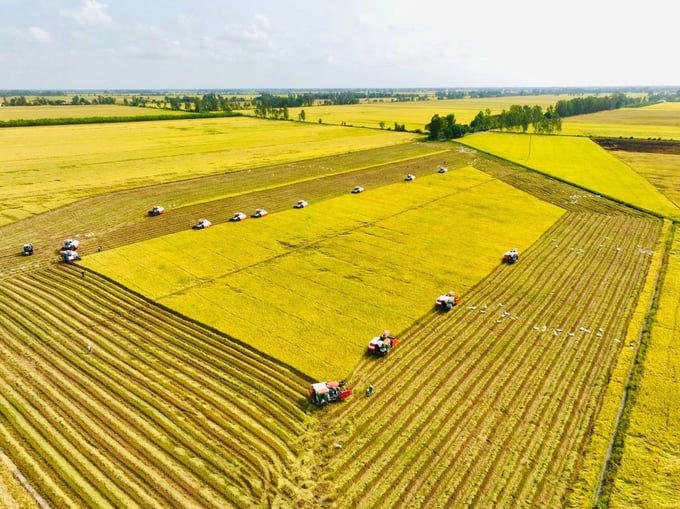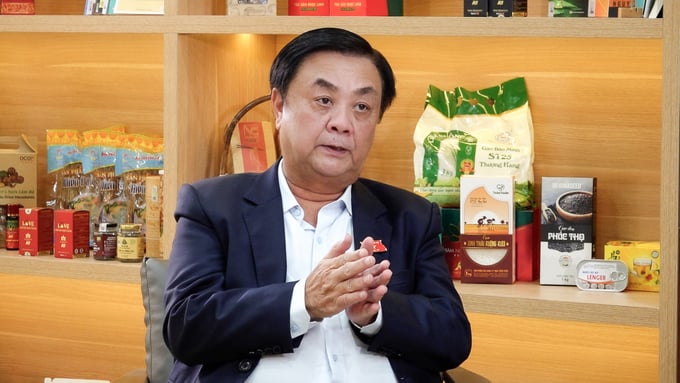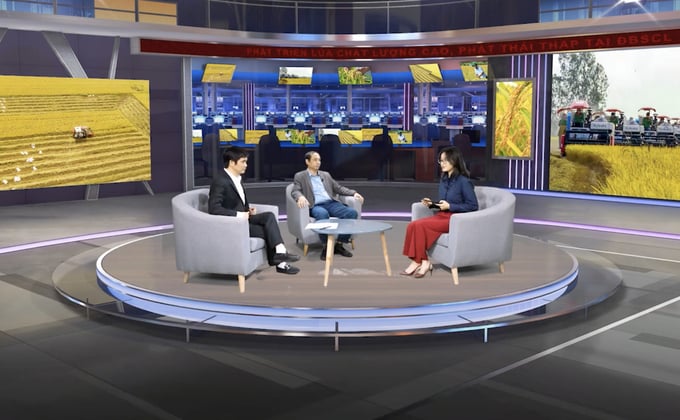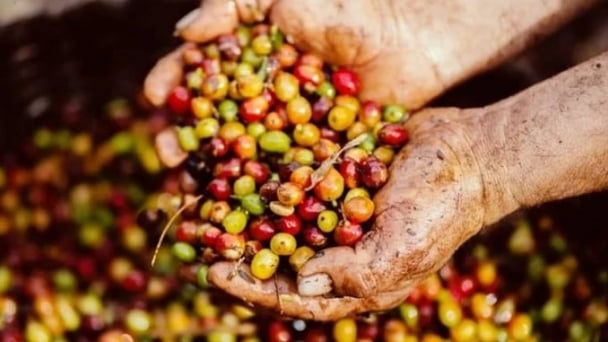June 18, 2025 | 03:18 GMT +7
June 18, 2025 | 03:18 GMT +7
Hotline: 0913.378.918
June 18, 2025 | 03:18 GMT +7
Hotline: 0913.378.918

The One Million Hectares Project marks a significant transformation in the landscape of rice production. Photo: Le Hoang Vu.
In recent years, the rice industry has steadily asserted its position as a pivotal sector in our country’s agriculture. The recent Government’s approval of the “Sustainable Development Project of one million hectares specializing in high-quality, low-emission rice cultivation associated with green growth in the Mekong Delta until 2030” is instigating momentum for the entire nation to embark on a sustainable trajectory.
A central focus of the Project is scientific and technological innovation, marking a significant stride toward green agricultural transformation in Vietnam.
Minister of Rural and Agricultural Development Le Minh Hoan said: “To produce well, we must start from seed research, water research, farming processes, and application of scientific advances in knowledge agriculture. For example, sensors are used in the field, drone spraying, mechanized techniques, etc.
Thus, there is still a lot of room to bring science and technology into the rice industry so that we can create higher value. Especially when moving from traditional rice production to high-quality rice, reducing emissions associated with green growth, associated with a circular economy.”

Minister Le Minh Hoan discusses the opportunity for the Vietnamese rice sector. Photo: Thanh Thuy.
Facing global challenges of climate change and environmental pollution, Vietnam's low-carbon rice model initiative is welcomed by international partners.
Regarding sustainable agriculture, Dr. Vo Tong Xuan, an esteemed rice scientist, shared: “One way to avoid climate change is to correct and improve how rice farmers apply fertilizer. On that basis, we produce high-yield rice at a lower cost thanks to using less fertilizer and reducing chemical fertilizer content, thereby reducing greenhouse gases from rice fields.”
The overall goal of the One Million Hectares Project is to reorganize the production system along the value chain, apply sustainable farming processes, improve the income and lives of rice growers, as well as protect the environment.
To achieve the target of cutting methane emissions by 30% by 2030, this transition will require significant investment and major policy reforms to promote and change the perceptions of stakeholders from farm households to the entire economy.
To realize the outlined objectives, the agricultural science industry will play a pivotal role in contributing knowledge, transferring techniques, predicting risks, and offering policy advice for the sustainable development of the rice industry. Simultaneously, there is a pressing need for specific policies to elevate the brand of Vietnamese rice and enhance the competitiveness of our country’s rice products in the international market.
Vietnam Agriculture Newspaper interviewed Dr. Tran Cong Thang (Director of the Institute of Policy and Strategy for Agricultural and Rural Development) and Dr. Dao The Anh (Deputy Director of the Vietnam Academy of Agricultural Sciences) to delve more deeply into the Project’s goals.
“The primary focus lies in restructuring production to establish specialized rice cultivation areas, standardizing varieties and production processes, implementing planting area codes, and standardizing emission reduction processes. Furthermore, concerning low emissions, the project encompasses measures to reduce emissions, minimize input resources, especially chemicals, and promote water conservation,” Director Thang informed.

Dr. Tran Cong Thang and Dr. Dao The Anh provide insights into challenges and solutions in rice production.
With a direction towards a circular economy, post-harvest considerations involve processing straw for subsequent use; rice straw will be recycled. The project envisions that in the future, 100% of straw will be collected from fields and repurposed to create added value.
Another key objective is by 2030, to establish 20% of export rice brands associated with low emissions, thereby bolstering the standing and value of Vietnamese rice on both national and global scales. From a social perspective, the project aims to train approximately one million farming households in sustainable farming practices by 2030, aligning with Vietnam's millennium goals.
Dr. Dao The Anh added to the conversation, providing information about low-emission rice production models in the world.
He said: “It can be affirmed that wet rice production is predominantly concentrated in Asia and Africa on a global scale. At the 6th International Rice Congress (IRC 2023) held in the Philippines, emissions reduction in wet rice production emerged as a pivotal topic, garnering extensive interest and discussion among international experts and researchers.
However, implementation proves challenging due to the prevalence of small-scale and dispersed farming households, posing a unique challenge for wet rice production. Addressing this challenge requires solutions that reduce emissions, enhance food production and minimize natural resource consumption. This is precisely the direction Vietnam is moving towards.”
The One Million Hectares High-Quality Rice Project, focusing on low emissions, is an initiative where Vietnam positions itself as a potential leader. It is a prudent decision, albeit bold and with certain challenges. Leading in this endeavor, Vietnam will garner support from the global community, both in terms of technical expertise and financial backing.
Translated by Quynh Chi
![Turning wind and rain into action: [7] Early disaster warnings help marine farmers minimize losses](https://t.ex-cdn.com/nongnghiepmoitruong.vn/608w/files/news/2025/06/17/z6704423696987_15fd32ffc26d590d204d520c9dac6786-nongnghiep-142942.jpg)
(VAN) In recent years, thanks to early disaster warnings and forecasting, marine farmers in Khanh Hoa province have been able to reduce risks and losses, thereby improving production efficiency.
![Turning wind and rain into action: [6] ‘Four on-the-spot’ disaster management software](https://t.ex-cdn.com/nongnghiepmoitruong.vn/608w/files/news/2025/06/17/e5a48259d6a262fc3bb3-nongnghiep-183800.jpg)
(VAN) By simply activating the scenario on the disaster management software, the relevant authorities immediately know how many households need to be evacuated, where to evacuate them to, and by what means of transportation…
![Turning wind and rain into action: [5] Hue applies modern technology in disaster forecasting](https://t.ex-cdn.com/nongnghiepmoitruong.vn/608w/files/news/2025/06/17/z6704423696987_15fd32ffc26d590d204d520c9dac6786-nongnghiep-093938.jpg)
(VAN) In Hue city, modern technology has recently been applied in meteorological and hydrological forecasting and warning, helping to reduce the damage caused by natural disasters.

(VAN) A cutting-edge farming technique being implemented on an experimental ranch in Arizona's Sonoran Desert has already saved a billion gallons of water over five years, according to Civil Eats.

(VAN) Poultry and pig production and the environment can be boosted through enhanced water technology, according to new research.

(VAN) Coffee prices on June 16, 2025 are unchanged. In Vietnam, local trading prices are holding steady, ranging around VND 112,000 – VND 112,500/kg.
![Turning wind and rain into action: [4] Bringing climate bulletins to remote and isolated areas](https://t.ex-cdn.com/nongnghiepmoitruong.vn/608w/files/linhnhp/2025/06/14/1152-z6704423696987_15fd32ffc26d590d204d520c9dac6786-nongnghiep-151141.jpg)
(VAN) The Vietnam Agriculture and Nature Newspaper interviewed Mr. Vu Thai Truong, Acting Head of Climate Change and Environment at UNDP Vietnam, to gain deeper insight into how climate bulletins are delivered to farmers.